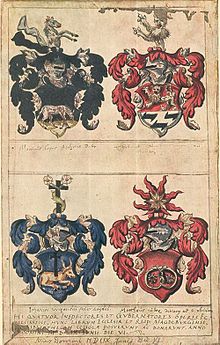Magdeburg Centuries
The Magdeburg Centurions (also Centuries ), published 1559–1574, are the first attempt at a comprehensive church history from the perspective of the Reformation .
The initiator, but probably not the author, was Matthias Flacius (1520–1575). The main editor was Johannes Wigand (1523–1587), later Evangelical Bishop of Pomesanien ( Prussia ) and author of botanical studies. Both were preachers at the St. Ulrich and Levin Church in Magdeburg , where much of the work took place. With the first volumes, Wigand was supported by a group of scholars who, like him, stayed in Magdeburg, among them Matthias Richter called Judex . The Basel humanist Johannes Oporinus acted as the publisher . Because of the division of labor, the authors are also referred to as centuriators .
The aim of the presentation was to present the Lutheran doctrine as the restoration of true faith and the early church and accordingly to expose the papacy and its church organization as a wrong path. However, this was done on the basis of extensive source criticism . Thus, among other things, the canons widespread under the name Pseudo-Isidore , which flowed directly into the Decretum Gratiani , i.e. Catholic canon law, were exposed as forgery.
The Magdeburg Centuries for the first time based a historical work on a division into centuries. They drew from the knowledge of their time (in particular Bartolomeo Platina and Albert Krantz ), but also from previously unprinted manuscripts that were searched for by eager informants all over Europe and copied for the centuriators. An exhaustive appraisal of the entire work is missing.
expenditure
- Ecclesiastica Historia integram ecclesiae Christi ideam quantum ad locum, propagationem, persecutionem, tranquillit., Doctrin., Haereses, ceremonias, gubernationem, schismata, synodos, personas, miracula, martyria, religiones extra ecclesiam: singulari diligentustis et fide ex vetimis patribus et aliis scriptoribus congesta per aliquot studiosos et pios viros in urbe [Ed .: Matthias Flacius, Johann Wigand, Mattheus Judix, Martin Köppe]. Basileae: Oporinus 1559–1574.
- Heinz Scheible (ed.): The beginnings of Reformation historiography: Melanchthon, Sleidan, Flacius and the Magdeburg Centurions (= texts on the history of churches and theology; 2). Mohn, Gütersloh 1966 (selection).
literature
- Heinz Scheible: The origin of the Magdeburg Centuries. A contribution to the history of the historiographical method . Gütersloh 1966 (publications of the Association for Reformation History; 183).
- Johannes Burkhardt : The origin of the modern calculation of the century: origin and development of a historiographical technique from Flacius to Ranke . Göppingen 1971 (Göppingen academic contributions; 43).
- Ronald E. Diener: THE MAGDEBURG CENTURIES. A Bibliothecal and Historiographical Study ( Memento of March 20, 2006 in the Internet Archive ). Revised diss. Cambridge (Mass.), Harvard Divinity School 1978/79.
- Martina Hartmann : Humanism and Church Criticism. Matthias Flacius Illyricus as an explorer of the Middle Ages . Stuttgart 2001 (contributions to the history and source studies of the Middle Ages; 19).
- The Magdeburg Centuries . Edited on behalf of the state capital Magdeburg for the 1200th anniversary by the city planning office. 2 volumes. Stekovics, Dößel 2007.
- Arno Mentzel-Reuters , Martina Hartmann (eds.): Catalogus and Centurien. Interdisciplinary studies on Matthias Flacius and the Magdeburg Centuries . Tübingen 2008 (Late Middle Ages, Humanism, Reformation; 45).
Web links
- Entry in the Catholic Encyclopedia , Robert Appleton Company, New York 1913.
- Martina Hartmann, Arno Mentzel-Reuters: The “Magdeburg Centuries” and the beginnings of source-related historical research: an exhibition by the Monumenta Germaniae Historica . Munich: Monumenta Germaniae Historica 2005. 28 p. PDF version
Individual evidence
- ^ Digital version of the copy from the Munich University Library, 4 ° H Eccl. 108 in the "Sources for the intellectual history of the late Middle Ages" in the library of the Monumenta Germaniae Historica ( http://www.mgh-bibliothek.de/digilib/centuriae.htm )
- ↑ table of contents
